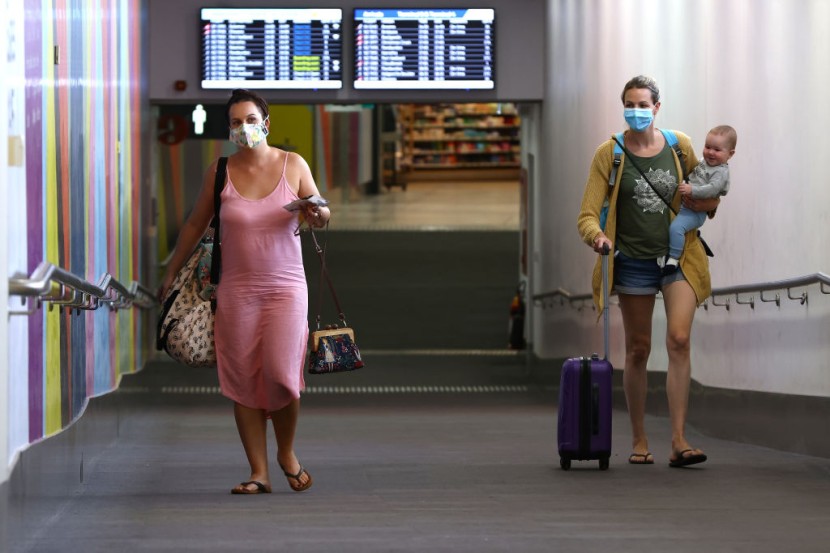On Thursday, Prime Minister Scott Morrison said Australia would seek a staggered reopening of its international borders. The decision comes to enable people who have been appropriately vaccinated against COVID-19 to fly abroad first.
Due to coronavirus restrictions, Australian nationals and permanent residents cannot leave the country. Unless they have an exception while returning, foreign travelers must stay in hotels for two weeks at their own expense. "I believe the first aim is to allow vaccinated Australians to move and travel, especially for important purposes," Morrison said at a community forum in Perth.
Australia seeks staggered reopening of borders

Western Australia Introduces Rules To Make Face Masks Mandatory At All Airports PERTH, AUSTRALIA - JANUARY 14: Passengers walk to the gate for their flight wearing face masks at Perth Domestic Airport on January 14, 2021 in Perth, Australia. Face masks must now be worn at all airports in Western Australia, with those refusing to comply at risk of fines up to $50,000. The new rule also applies to people in vehicles picking up passengers. The face mask mandate has been introduced due to concerns about the UK strain of COVID-19.
According to Morrison, vaccinated citizens could fly abroad for business and personal emergencies and then quarantine at home when they returned. Any partial border reopening would be "some time away." And it would not occur until vulnerable people were vaccinated as returning travelers might carry at least 1,000 new cases each week into a country where there is virtually no community transmission, Morrison told radio station 6PR Perth separately.
Why Brazil's COVID-19 Deaths Terrifyingly Increase Among Babies, Children
In March of last year, Australia closed its international borders to non-citizens and residents, allowing it to avoid the high levels of coronavirus seen in other affected countries, Reuters reported. There have been over 29,400 COVID-19 cases recorded, with 910 deaths. A "travel bubble" between Australia and New Zealand is due to open on Monday, one of the first such agreements since the pandemic began.
Any further relaxing of travel restrictions will certainly be dependent on the pace at which Australia completes its vaccine rollout, which has fallen behind schedule due to a lack of international supply and shifting medical advice. As of Wednesday, only 1.36 million overall doses had been administered, well short of the 4 million pledged by the end of March. Authorities confirmed the death of a vaccine patient late Thursday, and an inquiry was initiated to see whether there were any connections between the death and the vaccination.
Myanmar Security Forces Shoot Protesting Medical Workers
Vaccinated Australians could be the first to travel overseas
Australians who have been "properly vaccinated" when abroad will also be allowed to reenter the country, with all groups welcomed into home quarantine upon arrival, giving the nation's hotel quarantine scheme some space to breathe. Any reopening of the international border, which was shut down in March last year with few exceptions for New Zealand, will enable states and territories to prevent domestic border closures in the event of new outbreaks, said the Prime Minister.
Internal layoffs would "seriously damage our economy," Morrison added. Remarkably, Morrison suggested that if international border closures were lifted too soon, Australia could face thousand new cases of COVID-19 every week. However, it was assumed that all arrivals would be vaccinated.
His comment follows Health Minister Greg Hunt's earlier assertion that international borders could not reopen even though 100 percent of the population are vaccinated. "You couldn't just open the borders if the entire nation was vaccinated," Hunt said in Canberra on Tuesday, citing the need for more data on virus transmissibility among those who have received the vaccine.
The long-debated timetable for reopening Australia's border was thrown into disarray last week when the Federal Government announced that the AstraZeneca vaccine, which had been the primary candidate for tens of millions of Australians, was no longer approved for those under 50 due to possible links to exceedingly rare blood clots. Morrison officially suspended all targets of vaccinating the population before the end of the year due to choosing AstraZeneca substitutes for younger Australians. Qantas plans to prepare for the resumption of international flights beyond New Zealand in late October, despite growing uncertainty, as per Business Insider.
US Halts Use of Johnson & Johnson COVID-19 Vaccine Following Rare, Severe Blood Clots








